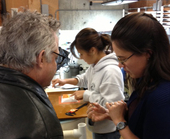IGERT Story
Science Journalist Visits UC Davis
Description
Sixty-five graduate students studying science, engineering, and technology spent a morning with NPR Science Correspondent Joe Palca as part of his two-day visit to UC Davis and the Bodega Marine Laboratory.
Palca emphasized the importance of selling science without trivializing it and described the way that he selects research to feature in stories. “Anything that’s intriguing is worth talking about. I want to do stories that tell people about the natural world. There’s a level of delight and joy in owning some knowledge about the world that no one else knows. I want to know why you’re doing science, why you find joy in it.”
Rosemary Hartman, a graduate student in Ecology and the REACH IGERT, commented afterwards that she enjoyed his perspective on reporting scientific research “even if it’s not likely to change the course of history,” and the informal nature of the dialogue.
Palca described upon his approach to science journalism as story-telling. “Once upon a time, scientists thought this. Now, thanks to this new research, they think this.”
He also reflected about the complexity of the modern world, public understanding of science and the scientific process, and the role of journalists. “When Darwin’s Origin of Species was published, an ordinary educated citizen could go out, purchase the book, read it, and understand it. Today, that’s no longer true for scientific research. That’s where scientific journalism comes in.” However, he further speculated that the rise in science writing has increased public skepticism about science because the general public now has the opportunity to learn about scientific discoveries as they develop. Although scientists understand that research changes the nature of scientific understanding, many citizens take a negative view of this process.
Palca recommended that students approach media interviews as a dialogue with the interviewer. “Never forget you’re not talking to a professional colleague. Start at a basic level and ask the journalist to describe their understanding to you. It’s their job to communicate your work to the public.”
Palca closed his discussion with graduate students by encouraging students to write to him with descriptions of their research for potential stories. Erik Porse, a REACH IGERT trainee and environmental engineering student, commented, “I worked in public policy for science, international affairs, and technology development for a number of years, but even with that background, Palca’s insights regarding how different media sectors view scientific research were very instructive.” Matt Hamilton, another REACH IGERT trainee and graduate student in Ecology, added, “For me, Joe Palca’s Q-and-A with graduate students was especially valuable because he challenged me to think about my research in terms of questions like ‘what’s the most interesting part of your research’ and ‘what’s new in the world of ____.’ I also realized that science communication doesn’t always need to ‘sell’ the science based on economic impacts, social welfare, and global issues. Instead, a short and compelling story may be enough to draw people in and build interest for the real substance of the research.”
The Robert Mondavi Institute for Wine and Food Science and W. M. Keck Center for Active Visualization in the Earth Sciences (KeckCAVES) at UC Davis, and Bodega Marine Laboratory provided Palca with background for compelling stories by hosting Palca for tours and descriptions of current research.
Rick Grosberg, co-PI of the REACH IGERT and director of the Coastal and Marine Science Institute, expressed satisfaction with Palca’s visit. “Graduate students learned what eminent journalists like Joe want in a story, and what makes science news.” He added that in exchange, “We had a lot to show Joe about the modern face of highly collaborative scientific research and education — research that advances knowledge and the sustainability of our interactions with the environment. We are Joe’s ‘Big Story’ after all.”
A consortium of UC Davis organizations, including the NSF-funded IGERT programs in Responding to Rapid Environmental Change and Climate Change, Water, and Society; Coastal and Marine Sciences Institute; Center for Population Biology; and John Muir Institute for the Environment sponsored Palca for discussions with graduate students, meetings with faculty, tours of research facilities, and a public seminar.







